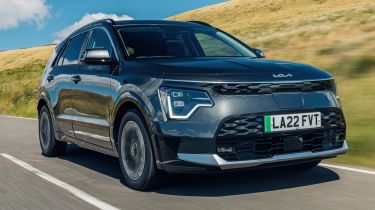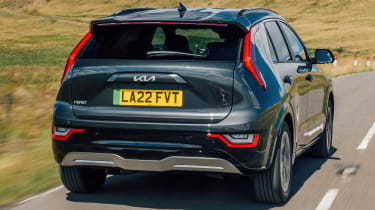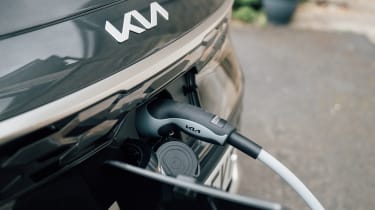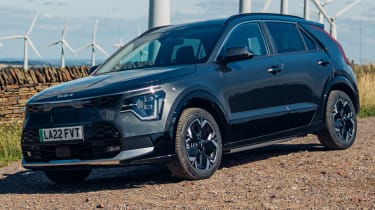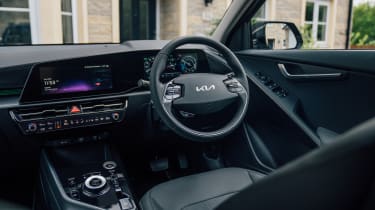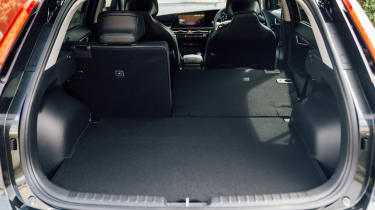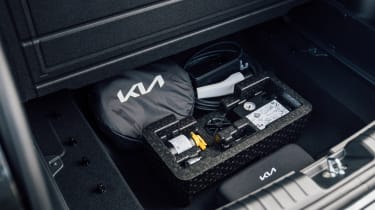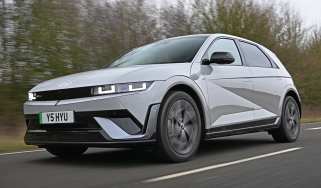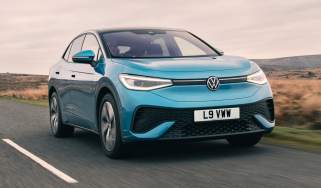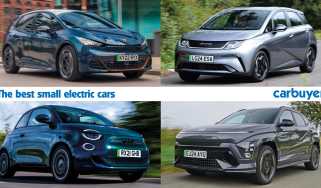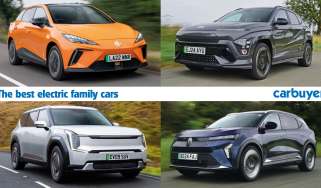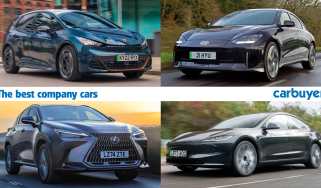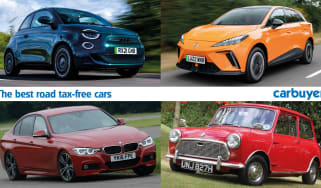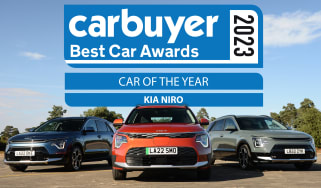Kia Niro EV review
“The new Kia Niro EV is better than ever and happens to be one of the best electric cars on sale”
Pros
- Fantastic infotainment system
- Realistic range figure
- Biggest boot of Niro models
Cons
- Top models aren’t good value
- Ordinary handling
- Slightly cramped rear seats
Verdict - Is the Kia Niro EV a good car?
The Kia Niro is so good that it won our coveted Car of the Year 2023 accolade. It’s great value, really efficient and full of useful tech. The Niro EV is the all-electric version and offers the lowest running costs of all the Niro models, plus it has a very good 285-mile range. With the excellent MG4 and BYD Atto 3 joining the market, the Niro EV is no longer amongst the cheapest small electric SUVs, but it’s still one of the best affordable electric cars around.
Kia Niro EV models, specs and alternatives
This is the new Kia Niro EV. Not to be confused with the previous Kia e-Niro, it builds on that car’s success and improves on it across the board. As before, the Niro is Kia’s electric small SUV and is closely related to the Hyundai Kona Electric.
The new Niro EV brings a more appealing front-end design along with higher-set tail-lights and some other tweaks, although the dimensions are broadly similar to the e-Niro. It’s clear Kia has focused on making the car better-looking, as a common criticism of the previous model was that it looked rather bland, something it’s tougher to argue about the new model.
 Kia Niro crowned 2023 Carbuyer Car of the Year
Kia Niro crowned 2023 Carbuyer Car of the Year
There are many rivals for the Kia Niro EV because it sits in a really popular class of car. Customers – mainly company car buyers, but also private buyers – want electric cars that look smart and have enough room for their family, so small electric hatchbacks and SUVs are ideal for many. The Volkswagen ID.3, Renault Megane E-Tech Electric, Peugeot e-2008 and Citroen e-C4 are some examples of more established models, while Chinese-made newcomers such as the BYD Atto 3 and MG4 undercut them on price. High-spec versions of the Kia also rival models such as the Skoda Enyaq iV.
More reviews
In-depth reviews
You might even consider the larger, faster and more luxurious Kia EV6 – and some tech from that car has appeared in the new Niro EV. The interior has a more upmarket feel than before in the e-Niro, and the EV6’s dual-screen dashboard appears here too. It’s easy to use, looks great and is packed with all the features you could want including Apple CarPlay and Android Auto as standard.
There are hybrid, plug-in hybrid and fully electric versions of the Kia Niro, and while the Niro EV is most expensive to buy, it will also be the cheapest to run (especially as a company car). It uses a 65kWh battery for a range of 285 miles – more than many of its rivals. It’s also really efficient - we achieved 3.7 miles/ kWh in a recent test, which was better than the rival BYD Atto 3 – so you’ll charge up less often in the Kia.
Trims are simply called ‘2’, ‘3’ and ‘4’, and standard kit even includes LED headlights, a rear-view camera, 17-inch alloy wheels and a 10.25-inch instrument display, along with an eight-inch infotainment touchscreen. This grows to match the larger screen in higher trims.
Because there’s no petrol engine to package into the Niro EV, there’s actually more boot space than in either of the hybrid models. You also get more luggage space than in its closest rivals, but the positioning of the battery means the rear seat space is slightly compromised. Rear-seat passengers may find the floor too high – but this isn’t a problem unique to the Niro EV.
|
Trim levels |
Power options |
|
|
Kia Niro EV alternatives
Family Electric SUVs
Hybrid SUVs
Mid-size SUVs
Range, charging & running costs
The Kia Niro EV’s 285-mile range figure is only three miles up on the old e-Niro, and ideally we’d have liked the new car to achieve 300 miles or more. But in isolation, the range is very impressive, and is more than you get from many similarly priced EVs. The Renault Megane E-Tech can manage 280 miles, while the MG4 Long Range can hit 281 miles from a single charge. What’s more, Kia’s range estimates are very accurate, so you’ll be able to get close to or match the quoted figures.
During testing on UK roads, we found a mixture of urban, motorway and brisk B-road driving resulted in an efficiency figure of 4.4 miles/kWh, which matches the official range figure of 285 miles. In town we were able to hit 5 miles/kWh easily. In a more thorough test side-by-side with the rival BYD Atto 3, we saw 3.7 miles/kWh in the Niro and 3.5 in the BYD, so on identical roads the Kia is more efficient.
Fast-charging speeds of 72kW are okay if not class-leading, but find a compatible public charger and you’ll be able to top up from 10-80% in 43 minutes. On a cold day, the Niro EV can precondition its battery pack when a chargepoint is selected in the sat-nav, ensuring it’s ready for fast charging speeds when you arrive. While it has a slightly shorter range, the Renault Megane E-Tech’s 150kW peak charging means its driver should be able to get back on the road sooner.
As is common, the Niro EV is more expensive than equivalent hybrid versions, but the running costs should be lower once you’ve bought it. VED (road tax) is free for EVs and servicing shouldn’t cost as much as for a petrol-engined car, while business users will also like the Niro EV for its rock-bottom company-car tax costs.
|
Model |
Battery size |
Range |
|
Single motor - 201bhp |
65kWh |
285 miles |
Insurance
Insurance costs are higher than for a similar petrol small SUV, with the Niro EV sitting in groups 28 to 29. This is par for the course amongst rivals, however, with the MG4 starting in group 27 and the Cupra Born in group 25 out of 50.
Electric motor, drive & performance
Like a lot of EVs, the Kia Niro EV offers a smooth and quiet driving experience around town. It’ll feel very refined and cosseting if you’re swapping from a petrol or diesel car. And a clean-sheet design means that even existing Niro owners will notice the new car is quieter and soaks up bumps better, leading to a more mature feeling from behind the wheel. The ride isn’t perfect; the extra weight of the battery pack compared to the hybrid models means it can get a little unsettled over a long patch of poor tarmac.
Its steering is precise and its weight allows for smooth cornering with a reassuring feel. Not a lot of tyre noise makes its way into the cabin, either. Just don’t expect the sensible Niro EV to serve up much fun for the driver.
The driver can choose between five settings of regenerative braking using the steering-wheel-mounted paddles. This offers a broad range from coasting when you release the accelerator, to slowing without often needing to use the brake pedal in its strongest mode. It offers an impressive level of adjustability not found in most rivals.
Kia has also upgraded its highway Driving Assist aid, so as well as being able to drive the car within its lane on the motorway, a nudge of the indicator will also tell the car to check if it’s safe to change lane, and do so if possible. If a vehicle beside you gets too close, the Niro EV can also reposition itself to maintain a comfortable gap.
0-62mph and top speed
The Niro EV offers strong performance, too. Its 0-62mph time of 7.8 seconds is plenty for a family crossover, and it feels brisk even when joining a motorway. The e-Niro was a bit too sensitive to throttle inputs, to the extent that it was easy to spin the front wheels while pulling out of junctions. This over-eager feel has been dialled back for the Niro EV, so it’s easier to pull away smoothly.
|
Model |
Power |
0-62mph |
Top speed |
|
Single motor |
201bhp |
7.8s |
103mph |
Interior & comfort
We’re really pleased that the infotainment system from the Kia Sportage and EV6 has been put in the Niro as well. It’s one of the best touchscreen systems we’ve come across, and looks remarkably smart in high-spec ‘3’ and ‘4’ versions with two large screens. The menu layouts are very straightforward and everything loads quickly, even if the graphics aren’t quite as showy as some rivals. Entry-level models get a smaller media screen, but still with all the information and phone connectivity you expect. However, there’s a little too much glossy black trim, which scratches easily and shows up dust. If your eyes deviate from the elegant dashboard, it’s also easy to find cheaper plastics on items such as the door trims.
Infotainment and navigation
The trim levels match the sensibility of the car itself. They’re called ‘2’, ‘3’ and ‘4’, with the higher number equating to more standard equipment. Entry-level cars get a 10.25-inch screen and a digital dash plus Apple CarPlay and Android Auto. ‘3’ adds alloy wheels, tinted glass, folding mirrors, auto wipers, heated seats, a heated steering wheel, front parking sensors, wireless phone charging and a bigger infotainment screen with sat nav. These are all desirable features, which we think makes ‘3’ the most compelling trim in the range. Top-spec cars also come with a sunroof, heated rear seats and ventilated front ones and a powered tailgate. Cars in the highest ‘4’ spec also let you choose a different-coloured C-pillar, but we think the ‘4’ is a little expensive; it almost overlaps with the cheapest EV6.
|
Key features | ||
|
2
|
3 (2 plus…)
|
4 (3 plus…)
|
Practicality & boot space
The Niro EV makes a great family SUV, especially now it has grown by 65mm in length, 10mm in width and it’s 10mm taller for this generation. In truth, it might be best if the back seats are reserved for children, because where the battery is placed has pushed the floor upwards. Adults may find the high floor leaves them with their knees high up and their thighs not properly supported, which is likely to get uncomfortable on a long journey. There are no complaints in terms of space, though; both leg and headroom are good. While the sloping front door trims look attractive, the door bins are rather small if you plan on using them for drinks bottles. We like the handy USB-C charging ports mounted on the sides of the front seats, however, which are easy to reach for those sitting in the back.
|
Size comparison | |||
|
Model |
Length |
Width |
Height |
|
Kia Niro EV SUV |
4,420mm |
1,825mm |
1,570mm |
|
Renault Megane E-Tech |
4,200mm |
1,860mm |
1,501mm |
|
BYD Atto 3 SUV |
4,455mm |
1,875mm |
1,615mm |
|
Volkswagen ID.4 SUV |
4,584mm |
1,852mm |
1,640mm |
Boot space
A 475-litre boot is not only more than you get in either of the hybrid models, but it’s more than you get in many of the car’s closest rivals. A Volkswagen ID.3 only gets 385 litres, for example, while a Peugeot e-2008 trails the Niro by about 40 litres. Even the MG5 EV estate loses out to the Niro EV by a few litres. Drop the seats down and you get 1,392 litres of space (fractionally less than the e-2008 in this configuration). The Niro also offers a 20-litre front storage area under the bonnet, which could be handy for cable storage.
|
Boot space comparison | |
|
Model |
Boot space |
|
Kia Niro EV SUV |
475 litres |
|
Renault Megane E-Tech |
440 litres |
|
BYD Atto 3 SUV |
440 litres |
|
Volkswagen ID.4 SUV |
543 litres |
Reliability & safety
Few manufacturers have managed such a comprehensively positive result in our annual Driver Power surveys as Kia did in 2023. As a brand, it came sixth out of 29 manufacturers, and three of the top 10 cars in our 75-strong list wear the Kia badge. That includes the electric EV6 and the Sportage SUV, while the previous-gen e-Niro came in 44th place overall.
Both the Sportage and EV6 gained five stars in Euro NCAP’s newest and strictest crash tests, and now the Niro has followed suit. The new Niro EV boasts plenty of safety kit as standard, including hill-start assist, intelligent speed limit assist, lane-keeping guidance and adaptive cruise control, plus the usual assortment of ISOFIX points and airbags. Both ‘3’ and ‘4’ trim levels add additional safety features, with the Kia Niro EV ‘4’ getting tech to help avoid bumps while parking, along with advanced collision avoidance that can detect crossing traffic at junctions.
Which Is Best?
Cheapest
- Name150kW 2 Nav 65kWh 5dr Auto
- Gearbox typeAuto
- RRP£37,325
Most Economical
- Name150kW 2 Nav 65kWh 5dr Auto
- Gearbox typeAuto
- RRP£37,325
Fastest
- Name150kW 2 Nav 65kWh 5dr Auto
- Gearbox typeAuto
- RRP£37,325
